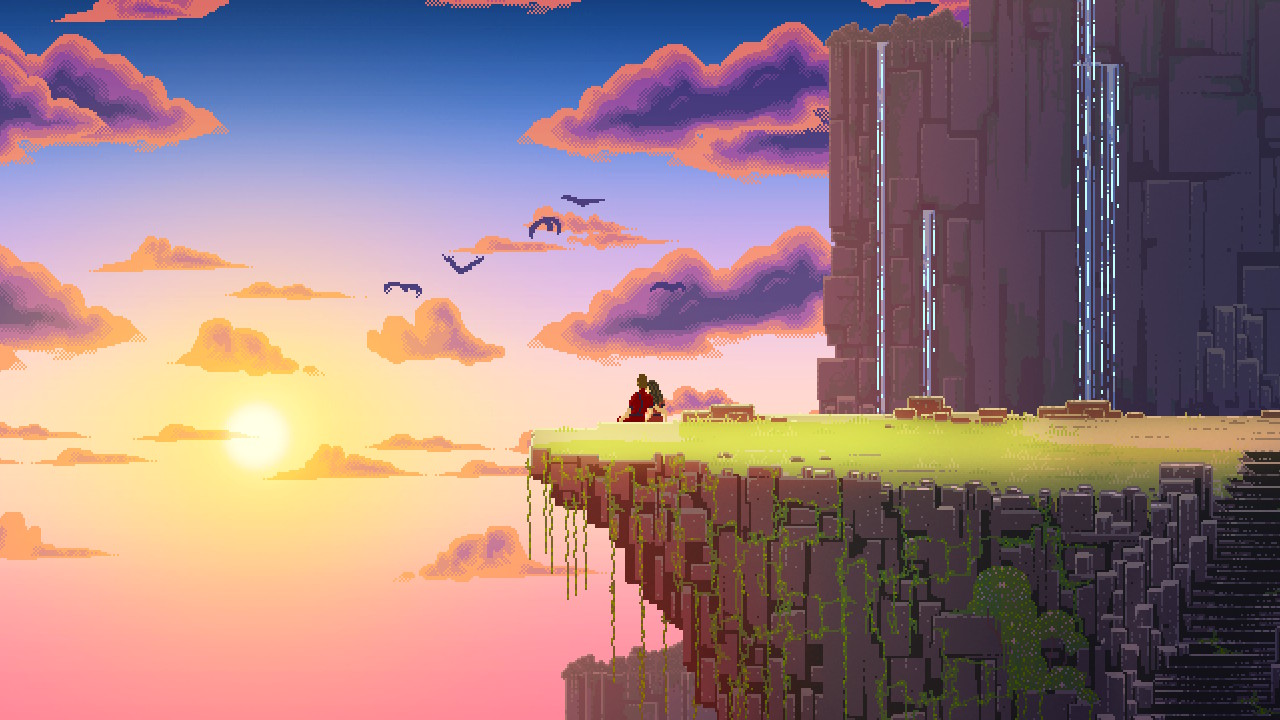
Recent am dat peste un joc care m-a surprins, așa că hai să vă povestesc ce s-a întâmplat. Obișnuiesc destul de des să răsfoiesc magazinele online de jocuri în căutare de reduceri și să văd ce mai e nou. The Way e un joc pe care l-am mai văzut, dar despre care nu știam mare lucru. Îmi amintesc că am citit pe undeva că ar fi un joc dificil și că nu ar avea controlul foarte prietenos (vorbesc despre versiunea de Nintendo Switch), în schimb screenshot-urile erau foarte faine. Se vedea că s-a depus multă muncă în pixelart și asta m-a lovit direct în nostalgie.
Prima impresie a fost că am de a face cu încă un retro side scroller. Dar m-am înșelat, și încă cum! Nu doar că nu e un side scroller așa cum mă așteptam, e un puzzle game foarte inspirat care arată mult mai bine în mișcare decât în screenshots. Și, cireașa de pe tort, muzica din joc e minunată și creează o atmosferă specială. Mi-a adus aminte instant de jocuri precum Another World sau Flashback.
Nu o să divulg informații despre poveste, vă las să o descoperiți voi, dar o să vă spun de ce am ajuns totuși să scriu acest articol. După ce am terminat jocul eram așa de încântat de experiență încât a trebuit să împărtășesc vestea pe Twitter. Acolo nu am tare mulți followeri, nu-s influencer de ăla, deci îmi cunosc destul de bine auditoriul (salut, joonior). Totuși - minunea internetului! - din noroc tweet-ul meu a ajuns la tipul care s-a ocupat cu muzica din joc, Panu Talus. Am schimbat niște impresii despre joc și-apoi m-am gândit că poate ați fi și voi curioși să aflați mai multe despre experiența lui, iar el a fost destul de amabil încât să răspundă unor întrebări.
Cine este Panu Talus și cu ce se ocupă el?
Sunt un muzician și compozitor auto-didact. Nu am studii de specialitate în domeniul muzicii. Asta înseamnă că nu știu să citesc partituri și îmi lipsesc cunoștințele de teorie a muzicii, așa că mă bazez doar pe experiențe și trăiri personale. Țelul meu principal este sunetul, expresia sunetului și emoția pe care o trezește în mine. Consider că metoda mea de a compune muzică e unică pentru că în principiu se bazează pe improvizație și inspirație de moment, iar modul acesta de a lucra necesită niște intrumente speciale.
Momentan sunt șomer. Chiar dacă am aboslvit de peste 10 ani școala tehnică "Vocational Qualification in Business Information Technology" nu m-am specializat destul încât să profesez în domeniu. Mereu am fost interesat de calculatoare încă de când eram mic, iar în afară de studioul meu alte hobby-uri ar fi calculatoarele vechi din anii 80-90 care folosesc MS-DOS.
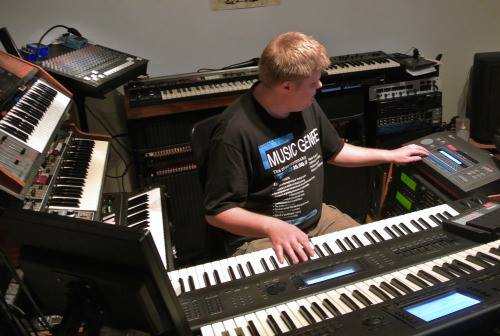
Care a fost rolul tău în dezvoltarea jocului The Way și cum ai ajuns să cunoști echipa și să lucrezi cu ei?
Unul dintre prietenii mei de pe Skype cu care am păstrat legătura de-a lungul anilor știa că compun muzică pentru jocuri indie și aprecia ceea ce fac, așa ca m-a invitat să mă alătur proiectului la care lucra. Prin urmare a fost foarte simplu, deci mă consider norocos.
Am fost implicat în proiect chiar de la început, deci am reușit să urmăresc tot procesul de dezvoltare. Mă consider o persoană destul de receptivă când vine vorba de stimulii vizuali ceea ce mă ajută să transpun mai bine emoțiile din imagini în muzică. M-a ajutat foarte mult în procesul de creație a soundtrack-ului faptul că am avut ocazia să testez jocul din faza incipientă. Presupun că am fost și unul dintre primii beta testeri, așadar am reușit să vin cu sugestii despre joc destul de devreme. În afară de coloana sonoră am creat și unele efecte audio.
Ce experiență profesională ai avut înainte de acest proiect?
Înainte de jocul The Way eram destul de activ în comunitatea AGS începând cu anul 2010. AGS vine de la ”Adventure Game Studio” un program gratis care îți permite să creezi jocuri adventure fără să deții cunoștințe avansate de programare. În acea perioadă am compus muzică pentru câteva jocuri indie mai mici create cu AGS. Prima data când am creat ceva ”serios” a fost pentru un joc numit Retina în 2012. Temele pe care le aborda erau foarte serioase așa că a fost destul de intrigant să compun muzică pentru un astfel de joc, chiar dacă timpul de muncă a fost limitat. Soundtrack-ul pentru jocul Retina puteți să îl găsiți pe pagina mea de Bandcamp.
Cred totuși că The Way a fost prima mea experiență cu adevărat profesională, debutul meu în lumea jocurilor indie comerciale. A fost pentru prima oară când m-am implicat complet într-un proces compleșitor de creație.
Cât timp petreci în afara orelor de muncă pentru a te perfecționa?
Depinde destul de mult. Uneori petrec zile în șir producând muzică, dar alteori pot să treacă chiar și ani fără să produc nimic. De exemplu, după ce am terminat munca la Retina în 2012 nu am mai compus nimic până în 2014 când am început munca la The Way. Bineînțeles că acesta nu e un lucru benefic pentru că e nevoie de repetiții și muncă susținută pentru a te menține în formă, iar pe lângă asta unele instrumente din studioul meu sunt atât de complexe încât mi se întâmplă să și uit cum funcționează după pauze așa lungi.
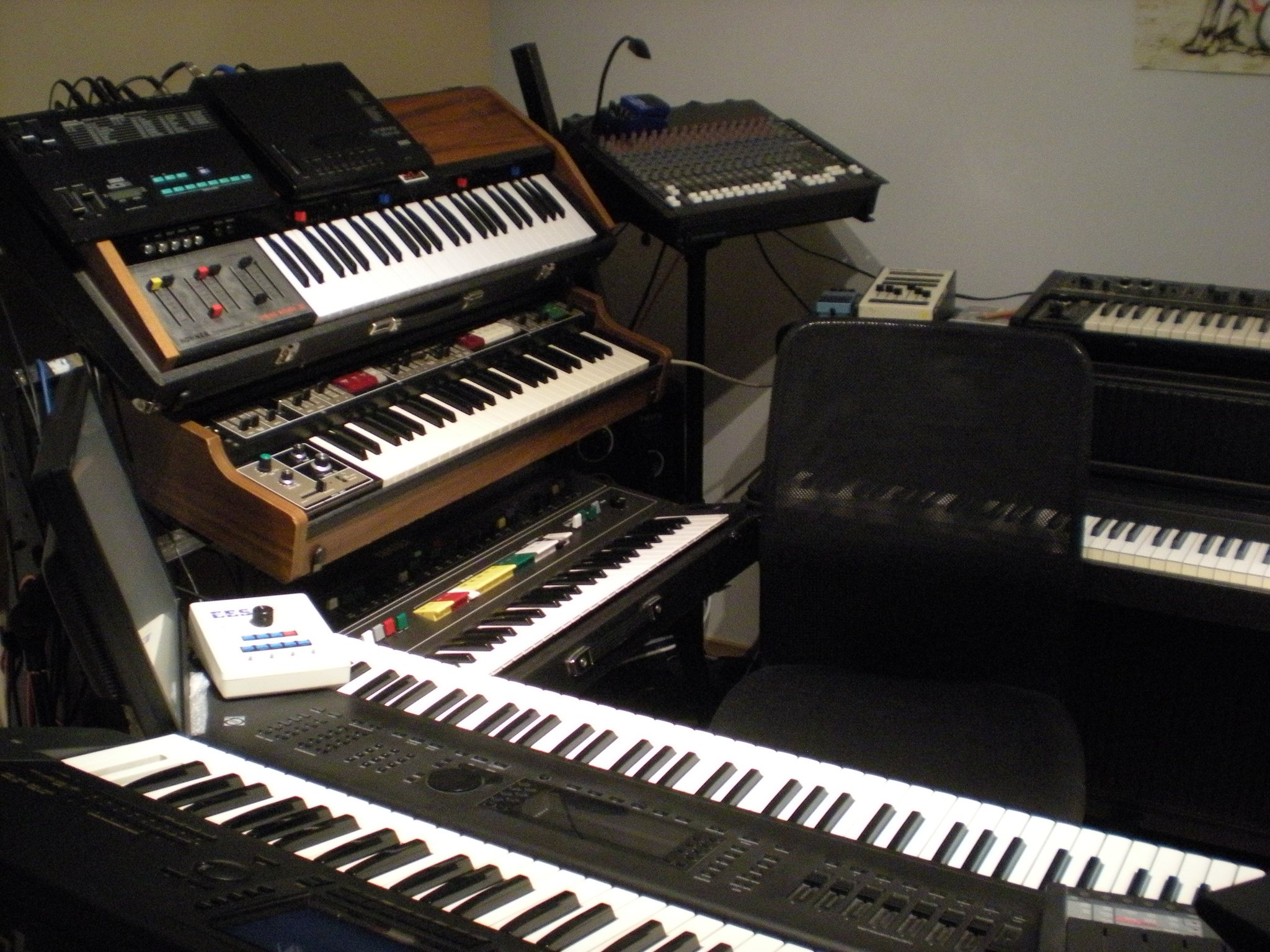
Câți oameni au luat parte la crearea acestui joc? Este totul făcut ”in-house” sau s-a apelat și la ajutorul altor studiouri?
Echipa a fost formată din doar 3 persoane: ”șeful” meu care era regizor, scenarist și programator, un artist grafic și animator (care a creat tot pixelart-ul acela superb manual), iar apoi eram eu responsabil pentru soundtrack și unele efecte sonore. Nu au existat alte persoane implicate în proiect. Playway a fost studioul care s-a ocupat de marketing și de promovarea jocului.
Ce fel de dificultăți ai întâmpinat în timpul acestui proces și ce fel de compromisuri a trebuit să faci pentru a livra munca la timp?
Niciodată nu am lucrat după un program fix. Procesul creativ e dificil de obținut atunci când există limitări legate de timp și nu aș putea să estimez cât durează să compun o anumită piesă. Uneori reușeam să improvizez melodii întregi pe loc, în 10 minute, alteori dura 3 saptămâni de muncă minuțioasă, adăugând fragmente mici în încercarea de a obține aranjamentul muzical dorit. S-a întâmplat să nu îmi ajungă nici o lună de muncă, așa că am grăbit unele melodii ceea ce a dus la publicarea unor versiuni ”schelet” a ceea ce intenționam să fac de fapt și asta doar pentru că trebuia să trec la urmatoarea piesă.
Sunt un perfecționist și dacă rezultatul obținut nu e cel la care mă așteptam mă simt dezamăgit, chiar dacă cei din jur sunt foarte încântați de ceea ce a ieșit. Probabil că am așteptări prea mari de la mine.
Lucratul de acasă a fost dificil pentru că dacă nu te poți deconecta de la lucru ajungi să te stresezi mai mult, iar aceasta fiind prima mea experiență cu un proiect comercial, simțeam presiunea de a da tot ce am mai bun. Deoarece nu aveam experiență anterioară nu știam cât de bine o să pot să lucrez pe termen lung, cât de creativ pot să fiu pe termen lung și cât de inspirat pot să folosesc toate instrumentele din studio, testam așadar apele pentru prima oară. Era greu uneori să îmi dau seama cât de bine mă descurc.
Jocul în sine a necesitat atât de multă muncă încât a fost amânat cu un an, deci nu doar eu simțeam stresul.
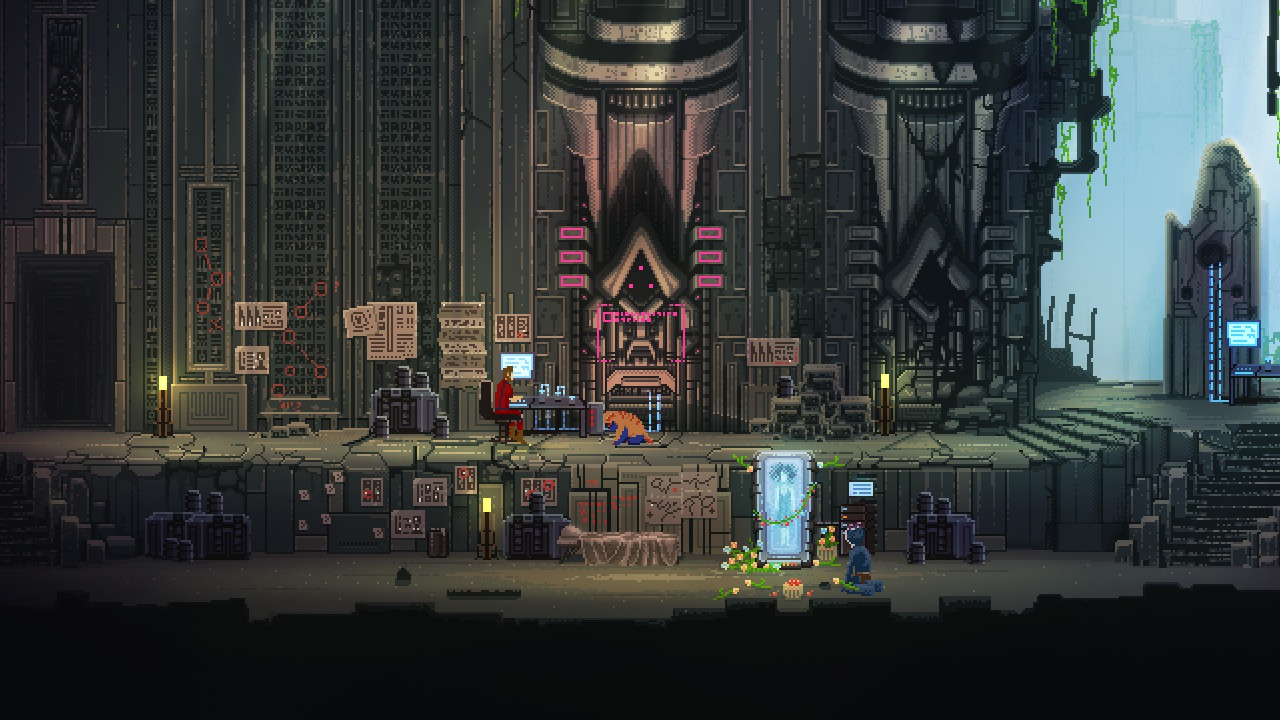
Menționam că jocul îmi amintește de niște jocuri clasice de origine franceză care au un soundtrack aparte. Ce te-a influențat în crearea melodiilor? Te-ai inspirat din alte jocuri, filme sau melodii?
Urmăresc cu plăcere multe filme, anime-uri și documentare și mereu mi-am dorit să pot să compun un soundtrack pentru un film sau un documentar, dar cum asta pare aproape imposibil de obținut faptul că am reușit să compun muzică pentru jocuri e în egală masură o oporunitate la fel de mare de a îmi împărtăși pasiunea și emoția cu o audiență.
Nu vreau să se înțeleagă ca aș considera filmele superioare jocurilor pentru că eu le consider complet diferite și obișnuiesc să mă joc mai mult decât să vizionez filme, dar pasiunea pentru a crea muzică vine de la TV.
Principala mea influență muzicală va fi întotdeauna Vangelis, dar nu e și singura. Mulți oameni afirmă că jocul The Way le dă o senzație de Blade Runner. Chiar am folosit în joc efectul original Reverb 224, același efect folosit și în muzica din Blade Runner!
Într-adevăr am iubit jocul Another World și a fost o influență majoră, dar recunosc că încă nu am încercat Flashback sau altele. În coloana sonora pentru The Way am avut influențe din multe alte jocuri de PC sau consolă. De exemplu pentru melodiile din ”Underground Temple” m-am inspirat dintr-o piesă din jocul de SNES Jurassic Park 2 pentru starea de groază, stranie și senzația de frică pe care o oferă, în timp ce pentru melodia ”Desert” m-am inspirat din Okami (cântecul numit ”Cursed Shinshu Field” ca să fiu mai precis) pentru sentimentul de singurătate, izolare și de frumusețe austeră.
Ce intrumente folosești pentru a compune muzică?
De obicei mă folosesc doar de instrumente hardware. Sintetizatoare digitale și analog, claviaturi electronice, samplere, procesoare pentru efecte audio, clape MIDI, pedale pentru volum și pian acustic. Laptop-ul din studio este folosit doar pentru înregistrare, iar software-ul pentru înregistrare e gratis și se numește Audacity.
Pot să spun că iubesc sunetul sintetizatoarelor analog vintage și ale celor cu corzi folosite în anii '70-’80, dar sunt foarte scumpe și necesită o întreținere aparte pentru a le menține funcționale.
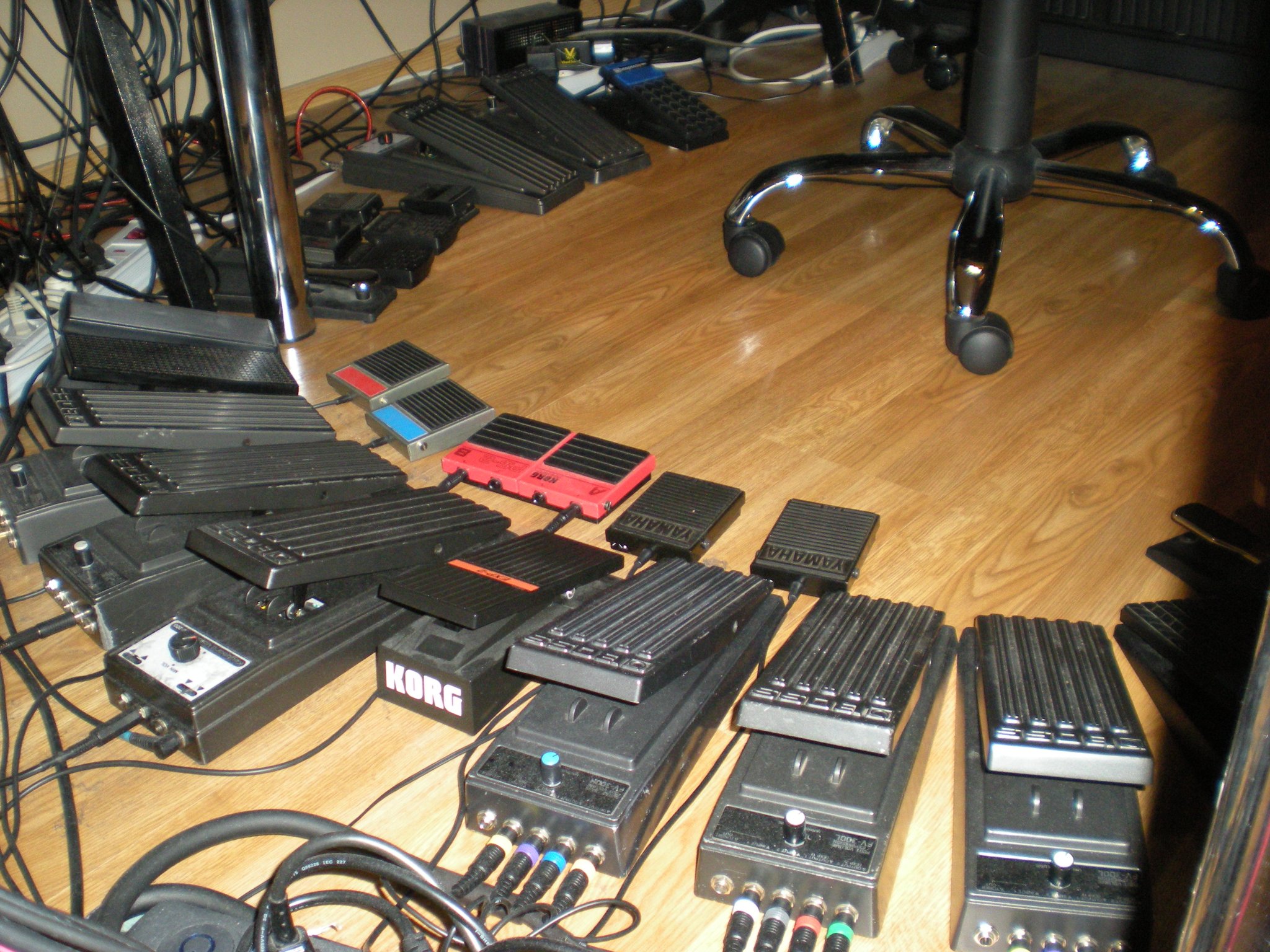
Ce lucruri noi crezi că a adus acest joc și cu ce te mândrești cel mai mult?
Inițial a fost creat din dorința de a avea un platformer cu o experiență cinematică asemănătoare cu Another World pentru că sunt foarte puține jocuri moderne din această categorie ceea ce e surprinzător și simt că a ocupat această nișă. Personal sunt absolut uluit de pixelart-ul din joc. E superb și incredibil de detaliat.
Fără a da prea multe detalii despre povestea principală spune-ne despre puzzle-ul tău preferat din joc.
Cred că preferatul meu e așa numitul puzzle ”MABEC”. Ți se cere să programezi un mic obiect pentru a ajunge la un întrerupător. E un puzzle cu un ritm destul de lent și necesită răbdare, dar pentru mine e relaxant și interesant. Din păcate acesta a fost exclus (aproape) complet din ediția remasterizată pentru că mulți jucători l-au considerat prea plictisitor.
Un alt segment preferat apare într-o secțiune din nivelul anterior unde era necesar să iei o foaie de hârtie și un pix și să îți notezi niște lucruri pe care să le ții minte și personal îmi place metoda asta de a participa într-un joc. Însă din nou acest lucru a fost schimat în versiunea remasterizată și jocul ține minte totul automat, ceea ce mi s-a părut că nu era necesar, mai ales ca Switch-ul te lasă să faci screenshot-uri. Din păcate această schimbare a dus și la eliminarea unui ”easter egg” amuzant.
Legat de produsul final, ce anume ți-a întrecut așteptările și ce crezi că ca ai fi putut face diferit?
Grafica și animația mi-au întrecut cu siguranță așteptările când am văzut jocul pentru prima oară. Mereu e interesant de văzut cum mici detalii pot să aibă un efect așa de mare făcând jocul mai bogat și mai spectaculos.
Majoritatea puzzle-urilor au fost excelente și variate, dar sunt și unele care mă fac să-mi dau ochii peste cap, cum ar fi tehnologie extraterestră străveche care se rezolvă cu…un puzzle de tip Simon says. Bineînțeles, nu e ușor să fii inspirat tot timpul. Cred că și modul de control putea să fie mai finisat dar te obișnuiești cu el destul de repede (cel puțin pe PC. Nu am testat varianta pentru Nintendo Switch, am văzut doar niște video-uri).
Legat de muzică, cred că mi-am întrecut propriile așteptări și majoritatea celor care o ascultă o apreciază. Trebuie să fi făcut o treabă bună, pentru că până și cei care au lăsat recenzii negative laudă muzica!
Ca un reproș personal, nu am apucat să creez la timp o temă unică pentru finalul jocului ceea ce eu consideram a fi cea mai importantă parte. În cele din urmă am pus la final o improvizație pe care o aveam de prin 2011, dar doar ambițiile mele personale și mândria au fost rănite de asta. Dacă o să reușesc vreodată să remasterizez soundtrack-ul și să îl lansez pe CD, cred că aș încerca să compun o piesă pentru final, așa cum era în planul original.
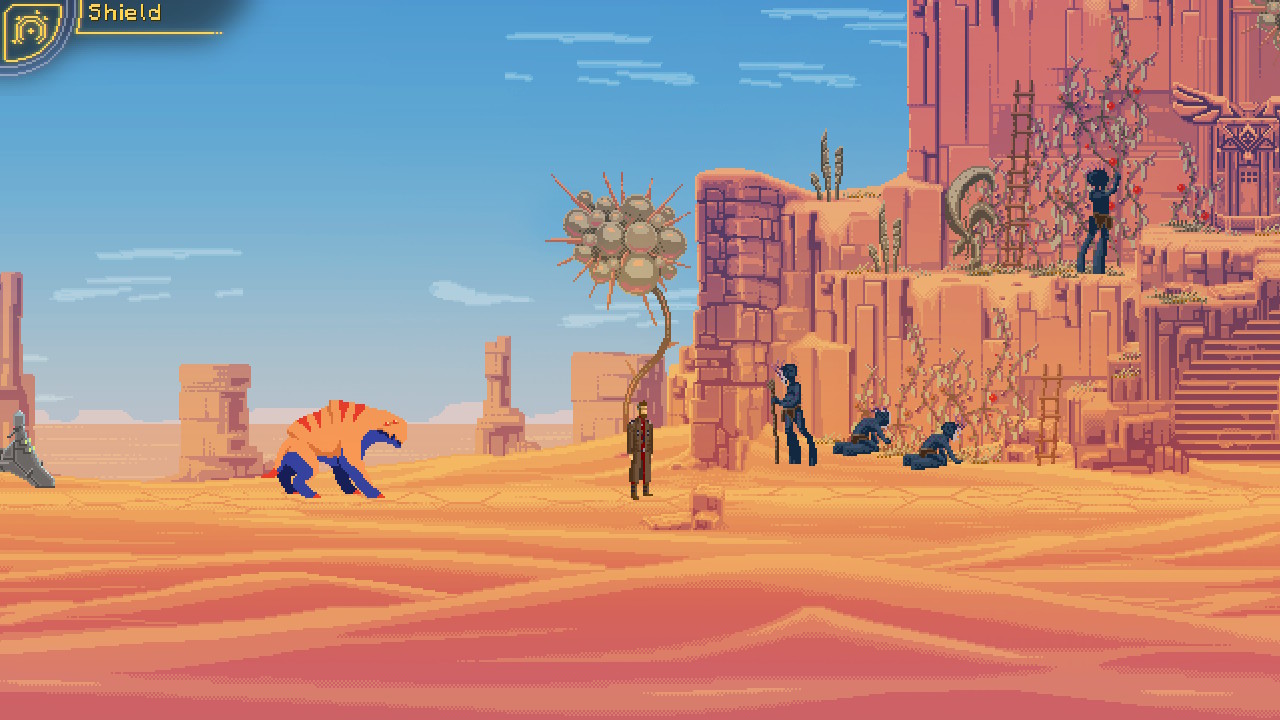
Au existat provocări noi când s-a portat jocul pe console?
Dacă bine îmi amintesc, nici unul dintre noi nu a fost implicat in remasterizarea jocului. De asta s-a ocupat un alt studio, Sonka. Din cauza unor întâmplări nefericite versiunea remasterizată a ajuns să conțină mai multe bug-uri decât cea originală de pe PC deși au muncit destul de mult să le rezolve și poate că muncesc în continuare.
E păcat că nu am știut de noua versiune decât după ce a fost lansată, pentru că ar fi fost un prilej bun să repar unele fragmente de melodii.
Povestește-ne despre experința ta cu jocurile – care a fost primul contact, care sunt preferatele tale și ce te mai joci zilele astea
La noi în familie am avut doar NES și am împrumutat SNES pentru scurte perioade de timp. Am avut ocazia să încerc multe console si PC-uri acasă la prieteni, dar noi am avut doar NES până când am făcut upgrade la PS1 la început de mileniu, iar mai apoi am avut un computer cu Windows XP. Dar fascinația mea pentru jocuri vechi în MS-DOS a rămas neschimbată, jocuri care nu erau compatibile cu noile sisteme de operare, așa că am început să vânez sisteme mai vechi unde să pot să le rulez fără probleme.
Încă de pe când a apărut PS2 mi-am pierdut interesul în jocuri noi, dar mult mai târziu am dat peste ceea ce avea să devină jocul meu preferat de PS2: Okami. Mai târziu am descoperit o comunitate creată în jurul jocurilor indie care încă îmi menține interesul chiar și azi. Se pare că cele mai bune jocuri single player axate pe poveste sunt în lumea indie, deoarece în zilele astea e mai profitabil să creezi jocuri multiplayer și clone de FPS-uri.
Jocurile mele preferate sunt cele retro de pe PC și console sau indie-urile moderne. În principiu îmi plac cele in genul Myst sau puzzle games dar și jocuri simple retro și cam orice fel de platformer. Câteva dintre preferatele mele din anii '90 pe care le și recomand ar fi Morpheus, The Last Express, Dark Eye, Zork The Nemesis si Beneath a Steel Sky. Sunt prea multe titluri NES și SNES pe care le-aș putea menționa, în schimb jocul meu preferat pentru Sega Mega Drive e World of Illusion.
Jocurile indie preferate sunt Undertale, Machinarium, Baba is You, Cave Story si Stanley Parable.
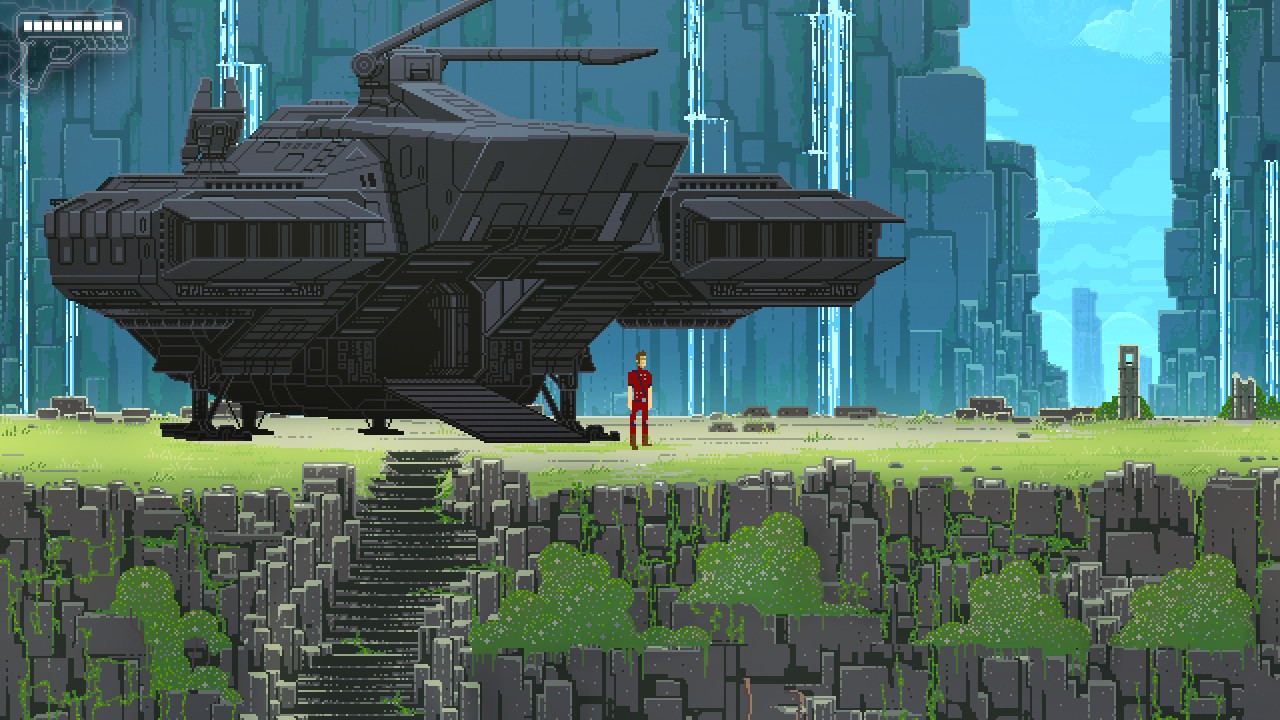
Finlanda nu e printre destinațiile de top pentru români atunci când vine vorba de călătorii sau muncă. Ce lucruri bune ai putea să ne împărtășești despre acest loc ”exotic”, cum îți petreci timpul liber și cum sunt oamenii de acolo?
Finlanda este o țară frumoasă și nu foarte dens populată, așa că este destul spațiu liber, multe păduri și multe lacuri. E destul de verde chiar și în marile orașe așa că îmi face plăcere să mă plimb cu bicicleta și sunt multe locuri pentru plimbări și cățărări în parcuri naționale și păduri.
În rest petrec destul de mult timp singur cu calculatoarele sau în sesiuni cu prietenii pe console vechi sau calculatoare cu MS-DOS. Îmi place să gătesc mâncare asiatică, în special thailandeză.
Ești implicat momentan și în alte proiecte? Cât de greu e să gasești proiecte noi?
De când am terminat munca la The Way în 2016 nu am mai participat la nici un alt proiect. Am avut nevoie de o perioadă foarte lungă de odihnă, dar nici nu am mai primit oferte noi de atunci. În 2018 am avut o reprezentație LIVE și plănuiam să am și altele, dar două dintre instrumentele de bază s-au defectat și a durat mult până am reușit să le repar. Dar plănuiesc să ma apuc în curând din nou de repetiții și o să caut și proiecte noi. Poate dă iar norocul peste mine?
Îți mulțumim foarte mult pentru timpul acordat și pentru toate detaliile împartășite. Ca ultimă întrebare, unde putem să îți găsim muzica online?
Cu foarte multă plăcere. O puteți găsi pe pagina mea de bandcamp:
https://panutalus.bandcamp.com/
Soundcloud: https://soundcloud.com/panu-talus
Twitter: https://twitter.com/MusicFurLife
Youtube: https://www.youtube.com/channel/UCIo895 ... s2kqW5nlAA
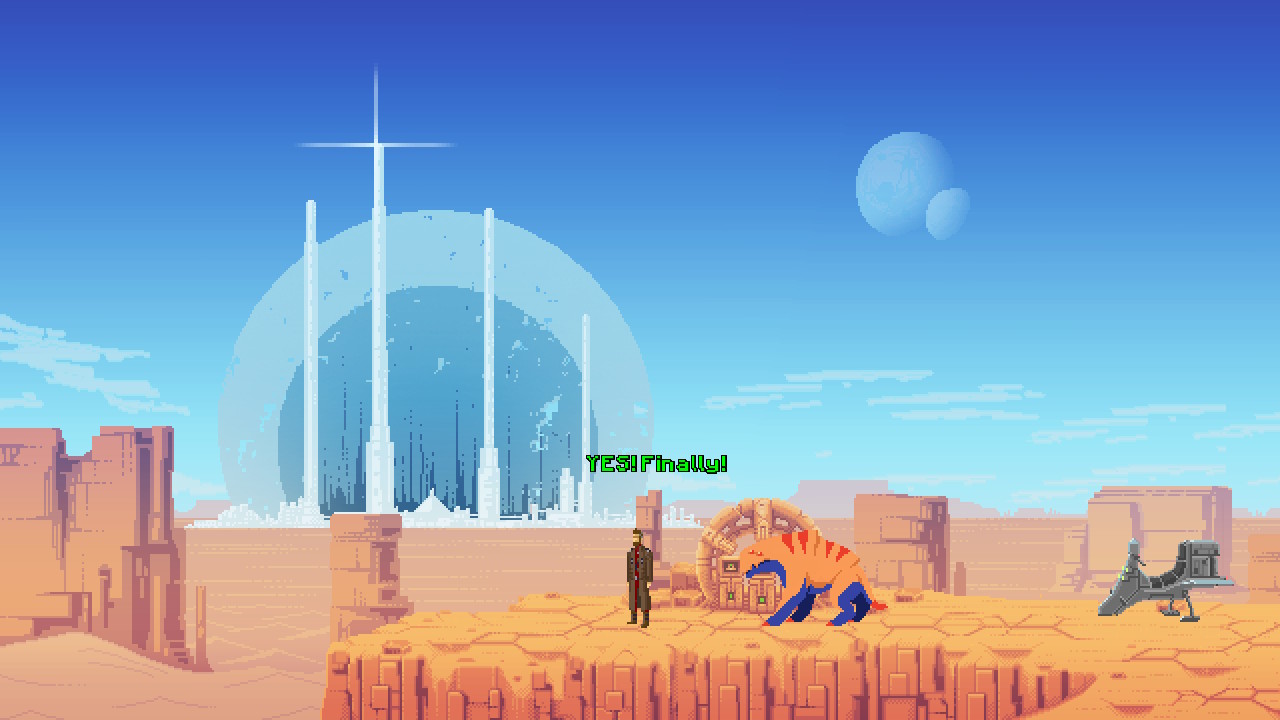
I recently got to play a game that managed to surprise me, so let me tell you about it. Quite often I browse the various online game stores to check for discounts and see what's new. Although I've seen it before, The Way was a game that I had no clue about. I remember reading something about it being difficult or that the controls are a bit off (I was checking the remastered Nintendo Switch version), but the screenshot were quite appealing. There seemed to be a lot of work put into the pixelart and that does tingle my nostalgia.
So, I thought, another retro side scroller, let's give it a try. And boy oh boy, was I in for a ride. Not only the game is NOT an action side scroller as I expected, it is actually a very inspired puzzle game, BUT the pixel art from the screenshots looked even better in motion. And, to top it all off, the music was amazing and helped creating this great atmosphere. Instantly made me think of classics like Another World or Flashback.
I will not spoil details about the story, you will have to find that for yourself, but I will let you know how I got to write this article. You see, after finishing the game I was so happy about the experience that I had to share my joy on Twitter. Now I don't have a great following there, I'm far from being an influencer, so I know my audience well. However, I was lucky enough for my tweet to reach the guy who worked on the soundtrack of this game, Panu Talus. We've exchanged some impressions and then I thought you might also be interested in finding out about his experience and he was kind enough to answer some of our questions.
Who is Panu Talus and what does he do for a living?
I'm entirely self-practiced musician and composer. I never had any studies or lessons about reading and playing music. This means that I can't read notes and I don't have any knowledge of music theories hence I entirely rely on my own experience and feelings. My main focus is the sounds itself, the expressions of sounds and what emotions they evoke in me. I always want music to be honest, expressive and have soul in it. My composing method is quite unique that I mainly improvise a lot and do things on-the-fly and such working method requires very special tools.
I am still unemployed currently. While I graduated decade ago in technical school for "Vocational Qualification in Business Information Technology", ie. general computer stuff, I wasn't specialized enough to get any jobs in that area. I have always been very interested in computers since I was a kid and today besides my studio, one of my hobbies are very old DOS computers from 80's and 90's as they are very nostalgic to me.
What was your role in the development of The Way and how did you get to meet the team and work on this game?
Well, basically one of my skype friends who I talked with a lot over many years, knew I was composing music for indie games and liked my work, asked me to join his game project. It was as simple as that so I guess I was lucky.
I was involved from the very early beginning so I was able to witness the ongoing game development process. Because I'm kind of visual person meaning that for me it's easier to convey emotions from visual images into music, it was great to be able to test the game by myself in early phases to help me composing music. I guess I was also kind of very early beta tester too in that sense I was able to give them feedback and suggestions about the game while testing it. Besides the music I also created some sound effects too.
What was your previous professional experience before getting here?
Before The Way game I was more active in AGS community forum around 2010. AGS stands for Adventure Game Studio which is free program especially designed to create adventure games without need for advanced programming skills. During that time I offered my "service" and composed music for some free, small indie games created with AGS. The very first time I composed something "seriously" was the AGS game called "Retina" in 2012. It had very serious themes so it was very intriguing game to compose music for though I had only limited time to compose the soundtrack. The Retina soundtrack is available for free in my Bandcamp site.
I think that The Way game was actually my very first "professional" experience, my debut in commercial indie game. It was the very first time I pushed myself into overwhelmingly extensive composing work.
How much time have you spent outside of working hours perfecting what you do now?
It depends a lot. Sometimes I can play something for days but then again there can be even years without composing anything. For example, I didn't compose anything after Retina 2012 until The Way started 2014. Of course that's not good because it's the regular practice that keeps up the muscle memory and also my studio is so complex that I can forget how specific things are working.
As an estimate, how many people took part in creating this game? Is it all done "in-house" or were other studios also involved?
The team was only 3 persons: my "boss" who was the director, scripter and programmer, one graphical artist and animator (who did all of those gorgeous pixels by hand!) and then me for entire soundtrack and a few sound effects. There were no other people involved in the game development. Playway company was the publisher who handled marketing and promoting the game.
What difficulties did you encounter during this process and what are some of the compromises you had to make in order to deliver on time?
I never had proper "schedules" in my work. Creative process is always very difficult to get done propely in specific time as I never can predict how much time a song can take. Sometimes I was able to improvise entire song on-the-fly instantly within 10 minutes while other times it took over 3 weeks of extremely careful work, adding small pieces one by one in order to achieve soundscapes I was looking for. Sometimes even a month wasn't enough so I had to rush couple songs into game while they were actually "bare bones" of what I originally intended while I had to already move on my focus into next song.
I have so high ambition that many times when the results doesn't match what I intended, it makes me disappointed in myself while actually others are absolutely loving the results. I am simply too hard for myself.
Working in home is also difficult because if you can't turn off your mind away from work, you get very stressed out and of course since this was my very first commercial project, I had huge personal pressure to do as best as I ever could. Also because it was my very first time working so extensively, I didn't have any previous experience about how well I could work for long period, how creative I could be for long period and how well I could use all of my instruments together so practically many things were kind of like testing the waters for the first time. At times it was very tough to figure out how things are actually working for me.
Also the game itself required so much of working that it was delayed from one year into two years so I wasn't the only one stressed out.
I was mentioning that the game reminds me of some classic French games which have a distinctive soundtrack. What inspired you to create the tracks? Were you influenced by previous games, movies or tracks?
I like to watch a lot of movies, anime and documentaries and I have always dreamed to be able to compose soundtrack for something like a movie or documentary but because that's very unlikely to happen, being able to compose music for games is equally great opportunity to share my passion and emotions with audience.
I don't mean to say that movies would be "better" than games because they are entirely different medium and I play more games than watch movies but my passion to create cinematic music comes from TV.
My main influence to music is always Vangelis in every way but he's not the only one. It also explains why so many people are hearing Blade Runner vibes in The Way game. I actually used original Lexicon 224 reverb effect in the game, the very same reverb effect which was used in Blade Runner music 1982!
Yes, I absolutely loved Another world and was a strong influence though I still haven't played flashback and others yet. Specifically to The Way soundtrack, I had influences from many computer games and console games. For example, the "Underground temple" songs had influence from one specific song of SNES game Jurassic Park 2 for its dread, eery and uncanny ominous feeling while the song "Desert" was actually very strong influence from Okami soundtrack (the song "Cursed Shinshu Field" to be exact) for its feelings of loneliness, isolation and austere beauty.
What tools do you use to create music?
I use mainly hardware equipment. Digital and Analog synthesizers, electronic keyboards, sampler, audio effect processors, various midi tools, volume pedals and also acoustic piano. The studio laptop is only to record audio and the audio recording software I used is free one called Audacity.
I really love the sound of vintage analog synthesizers and "string machines" used in 70's and 80's but they can be very expensive and require service to keep them working.
What novelty do you think the game brings and what are you most proud about the game?
Well, it was originally created from the desire to have cinematic platformer game in the style of Another world because there are actually really few modern games in this genre which is surprising and it certainly filled the void. I'm absolutely amazed at the gorgeous pixel art in the game. It's so beautiful and incredibly detailed.
Without giving out too many spoilers about the main story, tell us about your favorite puzzle.
I think my favourite is so called "MABEC" puzzle. It requires you to program a small moving object to reach a switch. It's pretty slow paced and needs patient but I found it somehow relaxing and interesting. Sadly this was (kind of) entirely removed from Remastered version because many players thought it was too tedious.
Another favourite part was from the earlier level where you actually had to take paper and pencil to write a few things down to remember them by yourself and I like this method that it makes you "participate" the game. However in Remastered version this was changed so that it remembers everything automatically which seems weird because especially in Nintendo switch there is screenshot function instantly available to save onscreen information. Sadly this change also removed another funny "easter egg" reference from the game.
About the final product, what about it has surpassed your expectations and what would you have done differently?
The graphics and animation certainly blew my mind when I first time saw it in the game. It's always amazing to see how little small details and especially in small animation parts makes the game so rich and beautiful.
Most of the puzzles were great and varied greatly but then there are couple ones that makes me cringe, like ancient technology hidden with a... simon says puzzle. Surely being creative most of the time is never easy. Also the controls would had benefitted from more polish but you get used to them pretty easily (at least in the PC version. I never tested Remastered version and only watched videos of it).
In the music part, I guess I surpassed my own expectations and most of the people likes it. I must have done great job when even the negative reviews of the game are still praising the music!
My personal failure is only that I couldn't make unique ending theme for the game in time which I thought was the most important part for myself. What we put into the ending theme was an improvisation from 2011 but only my personal ambition and pride was hurt. If I can some day afford having my soundtrack to be professionally mastered and printed into physical CD release, I think I will try to compose new unique ending theme as I originally planned.
Were there any challenges in working on the console versions?
If I remember correctly, none of us were ever involved in the Remastered version. It was entirely created by Sonka. Because of some unfortunate incidences the Remastered version ended up being a lot more buggy than original PC version though they were working a lot with it to fix things and maybe they are still fixing it.
Also a pity that I never knew about remastered version until it was already released because there were a few spots in the music that I would have liked to get "fixed" hence it would had been great opportunity.
Tell us something about your gaming experience - how did you start, what are some of your favorite games and what are you playing lately.
In our family we only had NES and borrowed SNES for short periods. I was able to try many different consoles and computers in friends' places but we had only NES until we finally upgraded into PS1 around after the millenium and then eventually we got WinXP computer too but I was still left with weird fascination to old DOS games which of course never worked in WinXP so that was the reason I started to hunt down old computers to able to play them without compability issues.
When I was younger I lost my interest into "new" games since the PS2 came but then much later I discovered my favourite PS2 game: Okami. Then later again I discovered this huge community of indie gaming which still keeps me interested to this day. It seems that great story driven single player games are only available in indie section because today it's much more profitable to create only multiplayer games and endless copies of FPS etc.
My favourite games are always old retro pc and console games and modern indie games. Mostly either in myst style adventure or puzzle oriented games and simplistic retro stuff and also all kind of platformers. Some of my various favourite 90's adventure games that I definitely recommend are Morpheus, The last express, Dark Eye, Zork the nemesis and Beneath the steel sky. There's too many NES and SNES to mention but at least my favourite Sega Mega Drive game is absolutely World of illusion.
From indie games my top favourites are Undertale, Machinarium, Baba is you, Cave Story and Stanley Parable.
Finland is probably not among the first locations for a Romanian when it comes to travelling or looking for a job. What are some of the good things you could share with our readers about this "exotic" place, how do you spend your free time and how are the people there?
Finland is beautiful and extremely sparsely populated country so there are plenty of space and a lot of forests and lakes. It's very greenish even in big cities so I enjoy very much of cycling and there's plenty of places for walking and hiking like national parks and forests.
Otherwise I spend a lot of time either alone with computer(s) or nerding out with my friends with retro consoles and DOS computers. I also like to cook asian food. Especially thai food.
Are you involved in any other gaming projects at the moment? How hard is it to find new projects?
Ever since The Way game 2016 I haven't joined any new projects. Practically I had to rest a long time after that but still I never got any new offers and it has been pretty silent after the game. During 2018 I played one of my songs in live and planned more to do gigs but two of my main instruments broke down and had to wait long time until they were fixed. However I think rather soon hopefully I will start to practice more and also look for new projects too. Maybe I will get lucky again?
Thank you very much for your time and for all the info, we really appreciate it. And as a last question, where could people go online and listen to your music?
You're very welcome. People can find my albums in my bandcamp: https://panutalus.bandcamp.com/
Soundcloud: https://soundcloud.com/panu-talus
Twitter: https://twitter.com/MusicFurLife
Youtube: https://www.youtube.com/channel/UCIo895 ... s2kqW5nlAA

